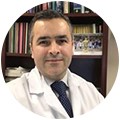Fourteen BUMC Faculty Promoted to Associate Professor
The following Medical Campus faculty have been promoted to the rank of associate professor:
 Michael Alosco, MED, Neurology, is a clinical neuropsychologist who focuses his research on three areas: (1) the relationship between repetitive head impacts (RHI) from contact and collision sport play and traumatic brain injury (TBI) with later-life cognitive and neuropsychiatric decline, as well as neurodegenerative disease(s); (2) development of in vivo biomarkers for CTE, Alzheimer’s disease and related dementias; and (3) the contribution of cerebrovascular disease to the clinical and neuropathological expression of CTE and Alzheimer’s disease. He is Co-Director of the Clinical Core of the BU Alzheimer’s Disease (AD) Center and a lead investigator in the BU CTE Center.
Michael Alosco, MED, Neurology, is a clinical neuropsychologist who focuses his research on three areas: (1) the relationship between repetitive head impacts (RHI) from contact and collision sport play and traumatic brain injury (TBI) with later-life cognitive and neuropsychiatric decline, as well as neurodegenerative disease(s); (2) development of in vivo biomarkers for CTE, Alzheimer’s disease and related dementias; and (3) the contribution of cerebrovascular disease to the clinical and neuropathological expression of CTE and Alzheimer’s disease. He is Co-Director of the Clinical Core of the BU Alzheimer’s Disease (AD) Center and a lead investigator in the BU CTE Center.
 Nahid Bhadelia, MED, Medicine/Infectious Diseases, designs and deploys evidenced-based infection control and biosafety training for clinicians and leverages emerging scientific research with extensive clinical background to improve the standard of care for patients with viral hemorrhagic fevers. She contributes to national and international training programs, guidelines and expert working groups on clinical care, research and infection related to Ebola virus disease. She helps design and implement clinical research on evaluation of natural history of emerging infectious diseases and the efficacy of related therapeutics and is principal investigator of the Boston Medical Center’s prospective COVID-19 patient cohort study. In addition, Dr. Bhadelia is Director of the Medical Response program associated with the NEIDL’s Biosafety Level 4 program, and Medical Director of the Special Pathogens Unit at Boston Medical Center.
Nahid Bhadelia, MED, Medicine/Infectious Diseases, designs and deploys evidenced-based infection control and biosafety training for clinicians and leverages emerging scientific research with extensive clinical background to improve the standard of care for patients with viral hemorrhagic fevers. She contributes to national and international training programs, guidelines and expert working groups on clinical care, research and infection related to Ebola virus disease. She helps design and implement clinical research on evaluation of natural history of emerging infectious diseases and the efficacy of related therapeutics and is principal investigator of the Boston Medical Center’s prospective COVID-19 patient cohort study. In addition, Dr. Bhadelia is Director of the Medical Response program associated with the NEIDL’s Biosafety Level 4 program, and Medical Director of the Special Pathogens Unit at Boston Medical Center.
 Laurie Douglass, MED, Pediatrics and Neurology, has devoted her career to childhood neurological disorders, specifically epilepsy and long-term follow-up of low birthweight babies. She created the Epilepsy Center at BMC, which includes a monitoring program and epilepsy nutrition program, as well as two resource websites, one for families who have a child with neurodevelopmental disabilities, and the other for families of children treated with dietary therapy for intractable epilepsy as well as a novel parent questionnaire that helps screen for and identify children with epilepsy disorders. For the past seven years, Dr. Douglass has been a co-PI for the NIH-funded Extremely Low Gestational Age Newborn (ELGAN) Study as well as the late adolescent extension of that study as part of the Environmental Influences on Child Health Outcomes (ECHO) Study. She also has been a leader in a national Lennox Gastaut Working Group Committee and a member of the national Got Transition Committee, which focuses on developing guidelines for epilepsy patients as they transition from pediatric to adult-oriented care.
Laurie Douglass, MED, Pediatrics and Neurology, has devoted her career to childhood neurological disorders, specifically epilepsy and long-term follow-up of low birthweight babies. She created the Epilepsy Center at BMC, which includes a monitoring program and epilepsy nutrition program, as well as two resource websites, one for families who have a child with neurodevelopmental disabilities, and the other for families of children treated with dietary therapy for intractable epilepsy as well as a novel parent questionnaire that helps screen for and identify children with epilepsy disorders. For the past seven years, Dr. Douglass has been a co-PI for the NIH-funded Extremely Low Gestational Age Newborn (ELGAN) Study as well as the late adolescent extension of that study as part of the Environmental Influences on Child Health Outcomes (ECHO) Study. She also has been a leader in a national Lennox Gastaut Working Group Committee and a member of the national Got Transition Committee, which focuses on developing guidelines for epilepsy patients as they transition from pediatric to adult-oriented care.
 M. Patricia Fabian, SPH, Environmental Health, has a multidisciplinary background in systems science, geographical information systems (GIS), infectious disease aerobiology, indoor air and environmental engineering. She combines these skills in interdisciplinary projects to study complex environmental systems and develop health-protective interventions. Dr. Fabian built the first systems science model to evaluate the impact of housing characteristics and resident behavioral changes on indoor air quality and pediatric asthma outcomes. She is a project lead in the Center for Research on Environmental & Social Stressors in Housing Across the Life Course (CRESSH), applying GIS and spatial analytical methods to quantify environmental health disparities in Massachusetts communities, and building cumulative risk models across the life course. More recently she’s used CRESSH methods and data to study heat exposure and vulnerability to Covid-19.
M. Patricia Fabian, SPH, Environmental Health, has a multidisciplinary background in systems science, geographical information systems (GIS), infectious disease aerobiology, indoor air and environmental engineering. She combines these skills in interdisciplinary projects to study complex environmental systems and develop health-protective interventions. Dr. Fabian built the first systems science model to evaluate the impact of housing characteristics and resident behavioral changes on indoor air quality and pediatric asthma outcomes. She is a project lead in the Center for Research on Environmental & Social Stressors in Housing Across the Life Course (CRESSH), applying GIS and spatial analytical methods to quantify environmental health disparities in Massachusetts communities, and building cumulative risk models across the life course. More recently she’s used CRESSH methods and data to study heat exposure and vulnerability to Covid-19.
 Neil Ganem, MED, Pharmacology and Medicine, uses innovative methods to illuminate the causes and consequences of genome instability. His work has revealed fundamental mechanisms through which numerical and structural chromosome abnormalities arise in cancer cells, and he has published several highly cited papers in top-tier journals. He has received numerous awards, including a K99/R00 Grant, an ACS Research Scholar Grant, a Smith Family Award, and a Searle Scholar Award. A devoted mentor and teacher, he received a BUSM 2019 Educator of the Year Award.
Neil Ganem, MED, Pharmacology and Medicine, uses innovative methods to illuminate the causes and consequences of genome instability. His work has revealed fundamental mechanisms through which numerical and structural chromosome abnormalities arise in cancer cells, and he has published several highly cited papers in top-tier journals. He has received numerous awards, including a K99/R00 Grant, an ACS Research Scholar Grant, a Smith Family Award, and a Searle Scholar Award. A devoted mentor and teacher, he received a BUSM 2019 Educator of the Year Award.
 Joel Henderson, MED, Pathology & Laboratory Medicine, is a nephropathologist and biomedical engineer whose multidisciplinary research program concerns kidney diseases that involve renal glomerular injury, and the response of the glomerulus to its mechanical environment. He has received support for his work from NIH and the Pfizer Center for Therapeutic Innovation (CTI), and in his laboratory he has mentored BU students and clinical trainees at all levels. The laboratory director for Framingham Heart Study, he oversees the study’s biorepository, which is a unique international resource of biospecimens collected over decades of research. In his clinical role he serves as the kidney pathologist for Boston Medical Center, and directs the residency program for the Department of Pathology and Laboratory Medicine.
Joel Henderson, MED, Pathology & Laboratory Medicine, is a nephropathologist and biomedical engineer whose multidisciplinary research program concerns kidney diseases that involve renal glomerular injury, and the response of the glomerulus to its mechanical environment. He has received support for his work from NIH and the Pfizer Center for Therapeutic Innovation (CTI), and in his laboratory he has mentored BU students and clinical trainees at all levels. The laboratory director for Framingham Heart Study, he oversees the study’s biorepository, which is a unique international resource of biospecimens collected over decades of research. In his clinical role he serves as the kidney pathologist for Boston Medical Center, and directs the residency program for the Department of Pathology and Laboratory Medicine.
 Karen Jacobson, MED, Medicine/Infectious Diseases, focuses on the epidemiology of TB, including determinants and risk factors of transmission, linkage to care, poor treatment outcomes and long-term sequelae. Dr. Jacobson has a specific interest in the intersection between TB and substance use, including alcohol and illicit smoked substances. Working in direct treatment of TB since 2010 in the U.S. and South Africa, and now as the Medical Director of the BMC/BPHC Tuberculosis Clinic, she has in-depth understanding of the challenges in identifying individuals with TB, linking them to car, and achieving successful outcomes. Dr. Jacobson is the PI on two NIH/NIAID R01s (the TRUST and TOTAL studies), leading investigations into the impact of substance use on TB transmission and treatment response.
Karen Jacobson, MED, Medicine/Infectious Diseases, focuses on the epidemiology of TB, including determinants and risk factors of transmission, linkage to care, poor treatment outcomes and long-term sequelae. Dr. Jacobson has a specific interest in the intersection between TB and substance use, including alcohol and illicit smoked substances. Working in direct treatment of TB since 2010 in the U.S. and South Africa, and now as the Medical Director of the BMC/BPHC Tuberculosis Clinic, she has in-depth understanding of the challenges in identifying individuals with TB, linking them to car, and achieving successful outcomes. Dr. Jacobson is the PI on two NIH/NIAID R01s (the TRUST and TOTAL studies), leading investigations into the impact of substance use on TB transmission and treatment response.
 Caroline Kistin, MED, Pediatrics, is a health services researcher with a focus on improving health outcomes and decreasing disparities for low-income children and families. Her work in developing, testing and implementing strength-based, family focused prevention interventions has been widely disseminated and used to inform national policy statements and best-practice guidelines. She is a member of the national Academic General Pediatrics Accreditation Committee and a senior mentor for the New Century Scholars Program through the Academic Pediatrics Association.
Caroline Kistin, MED, Pediatrics, is a health services researcher with a focus on improving health outcomes and decreasing disparities for low-income children and families. Her work in developing, testing and implementing strength-based, family focused prevention interventions has been widely disseminated and used to inform national policy statements and best-practice guidelines. She is a member of the national Academic General Pediatrics Accreditation Committee and a senior mentor for the New Century Scholars Program through the Academic Pediatrics Association.
 Allison Larson, MED, Dermatology, centers her scholarly work around three themes: medical education, gender equity and women’s health, and dermatologic issues in transgender patients. She has designed and implemented an 11-lecture series bringing together basic science and clinical content for first-year medical students and lectured nationally on interactive teaching methods. More recently, she developed an active gender equity research program. Dr. Larson is ranked at the top of providers at her clinical sites in terms of patient satisfaction scores and was named to BMC’s Provider Wall of Fame in 2018.
Allison Larson, MED, Dermatology, centers her scholarly work around three themes: medical education, gender equity and women’s health, and dermatologic issues in transgender patients. She has designed and implemented an 11-lecture series bringing together basic science and clinical content for first-year medical students and lectured nationally on interactive teaching methods. More recently, she developed an active gender equity research program. Dr. Larson is ranked at the top of providers at her clinical sites in terms of patient satisfaction scores and was named to BMC’s Provider Wall of Fame in 2018.
 Jesse Mez, MED, Neurology, is Director of the Clinical Core of the BU Alzheimer’s Disease (AD) Center and an investigator in the BU CTE Center, the Framingham Heart Study and the AD Genetic Consortium. His research seeks to understand genetic, neuropathological, epidemiological and clinical aspects of various forms of dementia. Since 2014, he has led the clinical arm and is a project leader of the Understanding Neurologic Injury and Traumatic Encephalopathy (UNITE) study, a U01/U54 project examining the neuropathology and clinical symptoms of brain donors who have experienced repetitive head impacts (RHI), including investigating clinicopathological correlation in and risk factors for CTE. He is principal investigator on DOD and NIH R01 grants investigating the relationship between traumatic brain injury/RHI and dementia-related clinical, imaging and neuropathological outcomes and their interaction with genetic factors.
Jesse Mez, MED, Neurology, is Director of the Clinical Core of the BU Alzheimer’s Disease (AD) Center and an investigator in the BU CTE Center, the Framingham Heart Study and the AD Genetic Consortium. His research seeks to understand genetic, neuropathological, epidemiological and clinical aspects of various forms of dementia. Since 2014, he has led the clinical arm and is a project leader of the Understanding Neurologic Injury and Traumatic Encephalopathy (UNITE) study, a U01/U54 project examining the neuropathology and clinical symptoms of brain donors who have experienced repetitive head impacts (RHI), including investigating clinicopathological correlation in and risk factors for CTE. He is principal investigator on DOD and NIH R01 grants investigating the relationship between traumatic brain injury/RHI and dementia-related clinical, imaging and neuropathological outcomes and their interaction with genetic factors.
 Suzanne Pineles, MED, Psychiatry, focuses on identifying psychophysiological and neurobiological mechanisms contributing to development and maintenance of posttraumatic stress disorder (PTSD), with a specific focus on the impact of sex-specific mechanisms of PTSD. Her study findings highlight the potential importance of sex-related hormones and their metabolites in contributing to PTSD symptoms and the retention of extinction learning. Dr. Pineles also is a Research Psychologist within the National Center for PTSD, Women’s Health Sciences Division, and Director of the Clinical Research Postdoctoral Fellowship in Clinical Psychology at VA Boston.
Suzanne Pineles, MED, Psychiatry, focuses on identifying psychophysiological and neurobiological mechanisms contributing to development and maintenance of posttraumatic stress disorder (PTSD), with a specific focus on the impact of sex-specific mechanisms of PTSD. Her study findings highlight the potential importance of sex-related hormones and their metabolites in contributing to PTSD symptoms and the retention of extinction learning. Dr. Pineles also is a Research Psychologist within the National Center for PTSD, Women’s Health Sciences Division, and Director of the Clinical Research Postdoctoral Fellowship in Clinical Psychology at VA Boston.
 Jose Rafael Romero, MD, Neurology, is a vascular neurologist with clinical interests in stroke prevention and service to racial and ethnic minorities. His research focuses on the study of subclinical cerebrovascular injury in brain imaging to identify individuals at high risk of stroke and dementia. His goal is to help develop preventive strategies and identify treatment targets for ischemic stroke and intracerebral hemorrhage, as well as dementia. His prior research has helped to advance knowledge of cerebral small vessel disease via NIH funded grants for the epidemiological study of cerebral microbleeds and more recently enlarged perivascular spaces (R01). He is an active Framingham Heart Study Investigator, with ongoing NIH funding and a member reviewer of a NIH study section. As a clinician educator, he consistently receives the highest marks on teaching evaluations and has mentored numerous fellows, junior faculty and medical students.
Jose Rafael Romero, MD, Neurology, is a vascular neurologist with clinical interests in stroke prevention and service to racial and ethnic minorities. His research focuses on the study of subclinical cerebrovascular injury in brain imaging to identify individuals at high risk of stroke and dementia. His goal is to help develop preventive strategies and identify treatment targets for ischemic stroke and intracerebral hemorrhage, as well as dementia. His prior research has helped to advance knowledge of cerebral small vessel disease via NIH funded grants for the epidemiological study of cerebral microbleeds and more recently enlarged perivascular spaces (R01). He is an active Framingham Heart Study Investigator, with ongoing NIH funding and a member reviewer of a NIH study section. As a clinician educator, he consistently receives the highest marks on teaching evaluations and has mentored numerous fellows, junior faculty and medical students.
 Teviah Erik Sachs, MED, Surgery, is a surgical oncologist focusing on the factors associated with disparities in surgical outcomes in patients with gastric, liver and pancreatic cancers. He is the PI for seven surgical outcomes research projects and co-investigator of seven. Dr. Sachs has collaborated with basic scientists as well as translational researchers. He is also involved in surgical education and is the associate program director for the residency in General Surgery. He is the recipient of the Department of Surgery’s inaugural Perlman Scholar in Pancreatic Cancer for 2020-22.
Teviah Erik Sachs, MED, Surgery, is a surgical oncologist focusing on the factors associated with disparities in surgical outcomes in patients with gastric, liver and pancreatic cancers. He is the PI for seven surgical outcomes research projects and co-investigator of seven. Dr. Sachs has collaborated with basic scientists as well as translational researchers. He is also involved in surgical education and is the associate program director for the residency in General Surgery. He is the recipient of the Department of Surgery’s inaugural Perlman Scholar in Pancreatic Cancer for 2020-22.
 Chadi Tannoury, MED, Orthopaedic Surgery, concentrates his research on the diagnosis and management of spine problems treated with cutting-edge minimally invasive techniques. Dr. Tannoury and his Orthopaedic Spine team have developed a new and less invasive approach to spinal fusions with reduced complications and improved outcomes. Dr. Tannoury was chosen by the Japanese Orthopaedic Association as a traveling fellow, lecturing and touring Japan’s largest academic centers in 2018. He also is lead author of the textbook, “Minimally Invasive Spine Surgery,” published in 2017. Furthermore, Dr. Tannoury is a talented artist; 100+ medical illustrations have accompanied his publications.
Chadi Tannoury, MED, Orthopaedic Surgery, concentrates his research on the diagnosis and management of spine problems treated with cutting-edge minimally invasive techniques. Dr. Tannoury and his Orthopaedic Spine team have developed a new and less invasive approach to spinal fusions with reduced complications and improved outcomes. Dr. Tannoury was chosen by the Japanese Orthopaedic Association as a traveling fellow, lecturing and touring Japan’s largest academic centers in 2018. He also is lead author of the textbook, “Minimally Invasive Spine Surgery,” published in 2017. Furthermore, Dr. Tannoury is a talented artist; 100+ medical illustrations have accompanied his publications.
View all posts